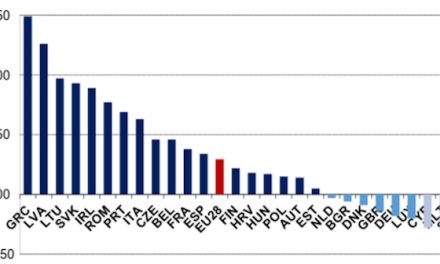The Ministry of Labour, Social Security and Social Solidarity and the country’s social partners have agreed on a roadmap to address undeclared work in Greece (Oct 26). The agreement builds on an effective social dialogue based on the main findings and recommendations of an International Labour Organization (ILO) Diagnostic report on undeclared work in Greece. The report estimates the size of the undeclared economy in the country at 25 per cent of GDP.
The roadmap was adopted during a workshop that took place in Athens by Georgios Katrougalos, Minister of Labour, Social Insurance and Social Solidarity; Giannis Panagopoulos, President of the Greek General Confederation of Labour (GSEE); Harry Kyriazis, Advisor to the Board of Hellenic Federation of Enterprises (SEV); George Kavvathas, President of the Hellenic Confederation of Professionals, Craftsmen and Merchants (GSEVEE); Vasilis Korkidis, President of Hellenic Confederation of Commerce and Entrepreneurship (ESEE) and Giannis Retsos, the First Vice President of the Association of Greek Tourism Enterprises (SETE).
“This roadmap is a major step to significantly increase efforts to curb undeclared work in Greece. It will help to avoid treating this form of work as a survival strategy for people excluded from the declared economy,” says Heinz Koller, ILO Assistant Director‐General and Regional Director for Europe and Central Asia.
The ILO report shows that undeclared work is pervasive in all professional categories. However, it is most prominent in a “lower tier” formed by young people and those with financial difficulties, and an “upper-tier” occupied by highly skilled professional groups such as lawyers, doctors and accountants.
Quoting a 2013 Eurobarometer survey, the study says that 67.3 per cent of undeclared work in Greece is in wage employment (with 13.3 per cent fully undeclared wage employment and 54 per cent under-declared employment.) 10.2 per cent was undeclared self-employment and 22.5 per cent consisted of paid favours for close social relations.
The high level of self-employment and the large share of micro-and small enterprises are also listed among the reasons for the size of the undeclared economy.
National action plan
The report calls for a national action plan to reduce undeclared work. Besides more effective deterrence measures, it proposes various incentives to businesses to move to the formal economy.
Established in close cooperation with the Greek government and social partners, the report and the roadmap are major outcomes of an ILO project funded by the European Commission on Supporting the transition from informal to formal economy and addressing undeclared work in Greece.
All proposals are based on ILO Recommendation 204 on the Transition from the Informal to the Formal Economy, adopted at the International Labour Conference in June 2015. The Recommendation provides strategies and practical guidance on policies and measures that can facilitate the transition from the informal to the formal economy.
The roadmap contains a sequence of interrelated actions which will support the fight against undeclared work in Greece between 2016 and 2019. It is based on two pillars: 1) a permanent tripartite social dialogue body which draws on the appropriate legal provisions and takes the responsibility for the integrated strategic approach towards tackling undeclared work in Greece; 2) the interoperability of data bases for the exchange of data between the different enforcement bodies.
PM Alexis Tsipras on collective labour agreements and underpaid work
Speaking at a meeting of SYRIZA’s central committee last month Prime Minister Alexis Tsipras stressed that concerning labour rights and the ongoing negotiations with the institutions, the government wants to restore collective labour agreements and stop underpaid work:
“Our planning is based on adopting a new productive model, on the condition that we protect employment. Based on this logic, we must put an end to underpaid work, undeclared labour and the continuous fear of layoffs. The most important step to that direction is the restoration of collective labour agreements, which is the basis for the protection of employees,” he said. “With this principle we come to the negotiations, while at the same time intensifying work on fighting undeclared work.”
Read more: ILO members agree on a roadmap to curb undeclared work in Greece; ILO’s Data on Greece; Independent Experts Report supports Greek positions on Labour Relations; Collective Labour Agreements: Regaining the lost grounq; Prime Minister Alexis Tsipras speech at SYRIZA’s central committee












